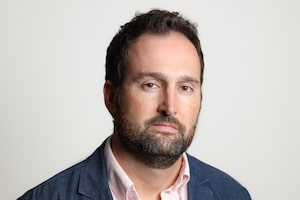Chief Supt. Darren Campbell is questioned by lawyer Tara Miller at the Mass Casualty Commission inquiry in Halifax, N.S., July 26.Kelly Clark/The Canadian Press
A senior RCMP commander who accused the country’s top Mountie of political interference in the Nova Scotia mass shooting investigation told an inquiry on Tuesday it was “unacceptable” that anyone might try to use the tragedy to advance the federal government’s gun control agenda.
Chief Supt. Darren Campbell, who oversaw the investigation into the mass shooting that killed 22 people in April, 2020, set off a political firestorm in June when the Mass Casualty Commission released his notes from a meeting in which he said RCMP Commissioner Brenda Lucki reprimanded him for withholding details about the killer’s guns.
The Commissioner told him she’d “promised the minister of public safety and the Prime Minister’s Office” the RCMP would disclose specifics about the firearms – which she said was “tied to pending gun-control legislation that would make officers and the public safer,” he wrote.
On Tuesday, Chief Supt. Campbell said he was very concerned about the potential for political interference in the active investigation. The RCMP owed the victims’ families an uncompromised and comprehensive investigation, he said.
“Any interference, whether it be political or otherwise that would have deterred us from properly investigating these events and seeking the justice that the families deserved was unacceptable to me,” he testified at the inquiry in Halifax.
“Whatever that would have been, whether it was political or not, I was very concerned that if it was politically motivated, how the families would perceive that. That bothered me.”
At a hearing held into the interference allegations in Ottawa on Monday, the Commissioner told MPs she was not under political direction from Prime Minister Justin Trudeau’s government to release information on the type of firearms. But she acknowledged she felt pressure to get more information to the public as quickly as possible.
That conflicted with the testimony of two other senior RCMP officials, including retired assistant commissioner Lee Bergerman, who said the Commissioner made it clear she was under pressure from the minister’s office and the PMO to release the information to buttress Liberal plans on gun control.
Testifying for a second day at the public inquiry in Halifax, Chief Supt. Campbell said he was deeply concerned releasing that kind of information at an early stage in the investigation would hurt the police’s ability to test the credibility of witnesses, or corroborate statements from someone who might confess to helping the gunman.
“The fact that we had an ongoing investigation that was both local or domestic and international, there was a very good reason why we could not release those details,” he told the inquiry. “We owed it to particularly the victims, survivors and their families to do our very best to be able to meet those objectives, period.”
The Mountie’s handwritten notes describing the tense conference call with the Commissioner on April 28, nine days after the mass shooting, were withheld from the inquiry’s investigators for months, fuelling calls of a cover-up by opposition parties. Chief Supt. Campbell said he couldn’t speak to conversations the Commissioner may have had with her political bosses, but he defended his description of the conversation with his superior.
“My notes are an accurate description of my recollection of that conversation and some of the words that were used,” he said.
“What transpired between the Commissioner’s office and anyone within government, I am not privy to that, I was never part of that. I stand by my notes.”
The senior Mountie also testified that he would have liked a quicker warning to the public during the mass shooting that the gunman was driving a replica RCMP cruiser. The Mounties have been widely criticized for withholding that information for many hours, believing 911 callers were mistaken.
He testified that the RCMP’s commander on the scene had complete authority to order that the information be made public and needed no approval from a superior such as himself.
The inquiry has heard that the commander delegated an officer to have communications staff alert the public about the replica vehicle shortly after 8 a.m. on April 19, but the tweet providing the information only went out at 10:17 a.m.
At least six people were killed during that time period.
Chief Supt. Campbell faced cross-examination from lawyers representing 14 of the 22 victims’ families. He acknowledged that families did not receive adequate support from the RCMP after the mass shooting.
Asked if the care of families met the minimal level of care, Supt. Campbell responded, “I would say ‘No’, because if it was good, there would be no complaints,” he said.
He testified that he favours the creation of a “national-level team” of RCMP officers trained to respond with “multiple resources and multiple services” to address the needs of families after major incidents like the mass shooting.
With a report from The Canadian Press.
Our Morning Update and Evening Update newsletters are written by Globe editors, giving you a concise summary of the day’s most important headlines. Sign up today.
 Greg Mercer
Greg Mercer